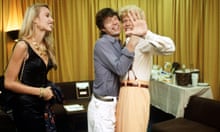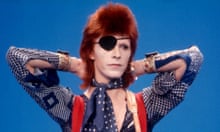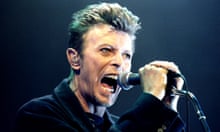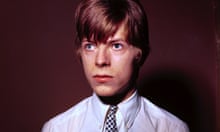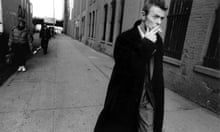David Bowie’s latest album, released last week to coincide with his 69th birthday, has been described as his “parting gift” as collaborators and friends paid tribute to the iconic star after the unexpected announcement of his death.
Friends and collaborators recalled Bowie’s final interactions with them amid a re-examination of Blackstar, his final work. It includes a new single, Lazarus, whose video opens with the image of a dead spaceman and which begins: “Look up here, I’m in heaven.”
In a Facebook post, Tony Visconti, who produced a series of Bowie’s albums, revealed the significance to Bowie of Blackstar, his 25th and final studio album, released to critical acclaim.
“He always did what he wanted to do,” wrote Visconti, who was a producer on Blackstar as well as Young Americans and his seminal Berlin trilogy: Low, Heroes and Lodger.
“And he wanted to do it his way and he wanted to do it the best way. His death was no different from his life – a work of art.”
Blackstar was the first Bowie release not to feature a picture of him on the cover: instead, a stylised black star heralded a darker work.
Visconti added: “He made Blackstar for us, his parting gift. I knew for a year this was the way it would be. I wasn’t, however, prepared for it. He was an extraordinary man, full of love and life. He will always be with us. For now, it is appropriate to cry.”
Bowie had kept news of his cancer diagnosis from all but a few close associates. His desire for privacy – and for his message to speak through his work – was achieved by a small inner circle including his manager, Coco Schwab; archivist Jimmy King; Bowie’s wife, Iman, and daughter, Lexi; and Visconti.
It was broadly known that Bowie’s onstage heart attack in 2004 had left him frail. But a sudden death was not foreseen, whatever the portents that can now be seen Blackstar.
“He considered [privacy] the greatest luxury,” said one friend familiar with the singer’s thinking, who did not wish to be named. “It was paramount to him in the way he lived his life over the last few years.”
The death of Bowie, who had a profound influence on music, fashion and sexuality in a career spanning more than half a century, was confirmed on in a Facebook post on his official page early on Monday. “David Bowie died peacefully today surrounded by his family after a courageous 18-month battle with cancer. While many of you will share in this loss, we ask that you respect the family’s privacy during their time of grief.”
Writing on Twitter, Bowie’s son, the film director Duncan Jones, 44, said: “Very sorry and sad to say it’s true.” Some were initially sceptical, but Bowie’s publicist, Steve Martin, told Reuters: “It’s not a hoax.”
Belgian theatre director Ivo van Hove, who worked with Bowie on his last stage musical Lazarus in New York, said the singer had been suffering from liver cancer.
Hove, who attended the premiere of Lazarus with Bowie in December, told Dutch NPO radio: “I have lived for a long time with the knowledge this was coming. I was with him on stage at the premiere of Lazarus a few weeks ago. I knew when he got into the car that it might be the last time.
“He had told me in confidence and I never broke that confidence. He told me about a year and three months ago, soon after he found out himself. Liver cancer.”
He said Bowie refused to postpone Lazarus. “He absolutely did not want to and I knew why. It reminded me of Dennis Potter, who kept on writing scenarios and scripts right up to his deathbed, in a fight against death and it was the same with [Bowie] too. He put up an incredible fight. He really didn’t want to die.”
He added: “It was incredibly painful to watch. He came to the rehearsals and walk-throughs as often as possible. And stayed, and I saw how much effort it was taking.
“At the premiere he seemed to be glowing with health, but afterwards he had to sit down right away. We chatted for 15 minutes. It has been very intense, working together but also keeping the secret.”
A long-time Bowie collaborator, the producer Brian Eno, told of how his death had come as a “complete surprise, as did nearly everything else about him” and revealed that he had received an email from him seven days ago.
“It was as funny as always, and as surreal, looping through word games and allusions and all the usual stuff we did. It ended with this sentence: ‘Thank you for our good times, brian. they will never rot’. And it was signed ‘Dawn’.
“I realise now he was saying goodbye.”
Eno, who knew Bowie for 40 years, said that they had started talking a year ago about revisiting Outside, the last album they worked on together, and “taking it somewhere new”.
Bowie’s 25 albums produced a string of hits including Changes, Life on Mars and Ashes to Ashes. He was known for experimenting across diverse musical genres, and for his alter egos – Ziggy Stardust, Aladdin Sane and the Thin White Duke. He also had a notable acting career.
Those joining in tributes included Mick Jagger, who collaborated with Bowie on the 1985 single Dancing in the Street, and said Bowie was always an inspiration to him and “a true original”.
“He was wonderfully shameless in his work,” Jagger said on Twitter, where he described him as a friend he would never forget.
We had so many good times together. He was my friend, I will never forget him. 2/2 pic.twitter.com/9xfPj88x8b
— Mick Jagger (@MickJagger) January 11, 2016
Another British rock legend, Pete Townshend of The Who, paid tribute on the band’s website.
“For those who were his fans he was a charismatic and exotic creature and still gloriously beautiful even as he approached 70. But face to face he was funny, clever, well-read, excited by the arts, and really good company.
“We have also lost a wonderful clown whose combined sense of mischief and creativity delightedly touched our hearts. David Bowie was my Salvador Dali.”
Describing him as a visionary artist, Bruce Springsteen said that Bowie had been an early supporter. “Over here on E Street, we’re feeling the great loss of David Bowie,” Springsteen told followers on Twitter. “Always changing and ahead of the curve, he was an artist whose excellence you aspired to.”
An hour after the news of Bowie’s death broke on Monday, fans began to gather near his apartment on Lafayette Street in the Soho district of New York. The first, Kate Corman, left a candle and flowers. “First Lou Reed, now David Bowie. It’s so sad. Unbelievable. New York is really over now,” she said.
At Puckfair, a bar across the street from Bowie’s apartment and frequented by the singer, the barman played a string of his hits – Jean Genie, Let’s Dance and Heroes. “It’s hard to put into words what he gave us in his songs,” said customer Bill Marlborough. “If you don’t feel it, I can’t explain.”
Flowers and tributes were also laid at a mural on a wall in Brixton, south London, where the singer was born, and a candle was placed outside a property in Stansfield Road, thought to be his childhood home.
Bowie had been absent from public view for a decade. After a heart attack while touring in 2004 there were only a few low-key live appearances – his last at a charity show in New York in 2006 when he performed alongside Alicia Keys – and an acting role in the film The Prestige the same year.
He was said to sit quietly in his apartment, or at the house in upstate New York near Woodstock, which he bought with the supermodel Iman, whom he married in 1992 and with whom he had a daughter, Alexandria, 15.
Paul Trynka, his biographer, told the Press Association the decade between his 23rd album, Reality, in 2003 and The Next Day in 2013 gave Bowie time to be “a family man”. “He walked Lexi [his daughter] to school every day – something he had missed with Duncan [his son], which was something he deeply regretted.”
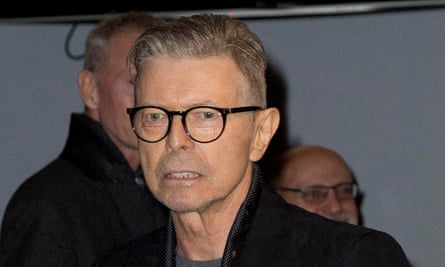
Ricky Gervais, the comedian and actor who convinced the famously private Bowie to star as himself in an episode of the 2006 sitcom Extras, wrote: “I just lost a hero. RIP David Bowie.”
The rock guitarist Joel Madden, quoting Changes, wrote simply: “Turn and face the strange.”
The rapper Kanye West said: “David Bowie was one of my most important inspirations, so fearless, so creative, he gave us magic for a lifetime.”
Glastonbury founder Michael Eavis recalled the singer’s first appearance at the Somerset festival in 1971. “He had lovely, long, flowing hair, a right hippie-looking lad. Fantastically beautiful he looked, actually,” Eavis told the BBC.
“Nobody knew who he was, he played at four in the morning at sunrise, a song we’d never heard before.”
Bowie was born David Robert Jones on 8 January 1947 in Brixton, south London, to mother Margaret “Peggy”, a waitnress, and charity worker Haywood “John” Jones. His older brother’s record collection introduced him to rock music at an early age.
The family moved to south-east London and he graduated from Bromley technical high school at 16, when he was busy forming a number of bands and leading a group. He called himself Davy Jones, later changing his name to David Bowie to avoid confusion with Davy Jones of the Monkees. The name was reportedly inspired by a knife developed by the 19th-century American pioneer Jim Bowie.
He released three singles as a solo artist for Pye Records, and a debut album David Bowie, but did not achieve huge success and retreated to a Buddhist monastery in Scotland in 1967.
After returning to London he started the arts troupe Feathers in 1968, then helped organise the Free festival, a day-long free music event in Beckenham, south-east London, in 1969. That same year he released Space Oddity, which went on to be his first UK No 1. The release the following year of The Rise and Fall of Ziggy Stardust and the Spiders From Mars made him an international star, and he conquered the US with his theatrical stage show.
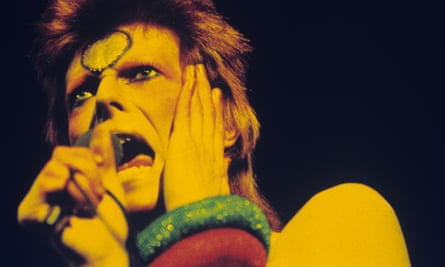
He produced albums for Lou Reed and Iggy Pop, as well as writing All the Young Dudes, which he gave to Mott the Hoople who had a massive hit with it. In the late 1970s he produced a three-album collaboration with Brian Eno, known as the Berlin trilogy.
Bowie’s acting career took off with his performance in Nicolas Roeg’s The Man Who Fell to Earth, followed by roles in Labyrinth, The Last Temptation of Christ and Absolute Beginners. More recently, he appeared as himself in the film Zoolander.
Bowie officially retired Ziggy Stardust in 1973, making the announcement during a London gig. But the hits kept coming, with albums including Aladdin Sane, Diamond Dogs and Pin Ups.
He changed direction with the soul-inspired Young Americans. His first US No 1 was a collaboration with John Lennon on Fame, which topped the charts in 1975.
He continued to sell millions of albums and pack out stadiums with the rise of the New Romantic scene in 1980s Britain. He embraced pop, finding chart success with songs such as Let’s Dance and Under Pressure, a collaboration with Queen.
Iggy Pop described him on social media as “the light of my life”, while singer Madonna tweeted: “Talented. Unique. Genius. Game Changer.”
The Rolling Stones hailed him as “an extraordinary artist and a true original”. Queen tweeted a link to the Under Pressure, with the words: “This is our last dance ... ”
The British prime minister, David Cameron, speaking in north London, said: “Musically, creatively, artistically David Bowie was a genius.”
Bowie once said that he was bisexual but he later suggested that his sexual interactions with men should be seen in the context of his wider cultural experimentation. “I was always a closet heterosexual,” he told Rolling Stone magazine in 1993.
In 1970 he married Angie Bowie, and the couple had a son named Zowie Bowie, now known as Duncan Jones. They split in 1980. He settled in New York one year after marrying Iman.
Bowie continued to record and tour until 2003, when he released Reality, his 23rd album, which many assumed to be his last.
“I am not a natural performer,” Bowie said in a rare interview in 2002. “I don’t enjoy performing terribly much. Never have. I can do it and, if my mind’s on the situation, do it quite well. But, five or six shows in, I’m dying to get off the road and go back to the studio.”
In the same interview, he said: “My entire career, I’ve only really worked with the same subject matter. The trousers may change, but the actual words and subjects I’ve always chosen to write with are things to do with isolation, abandonment, fear and anxiety, all of the high points of one’s life.”
